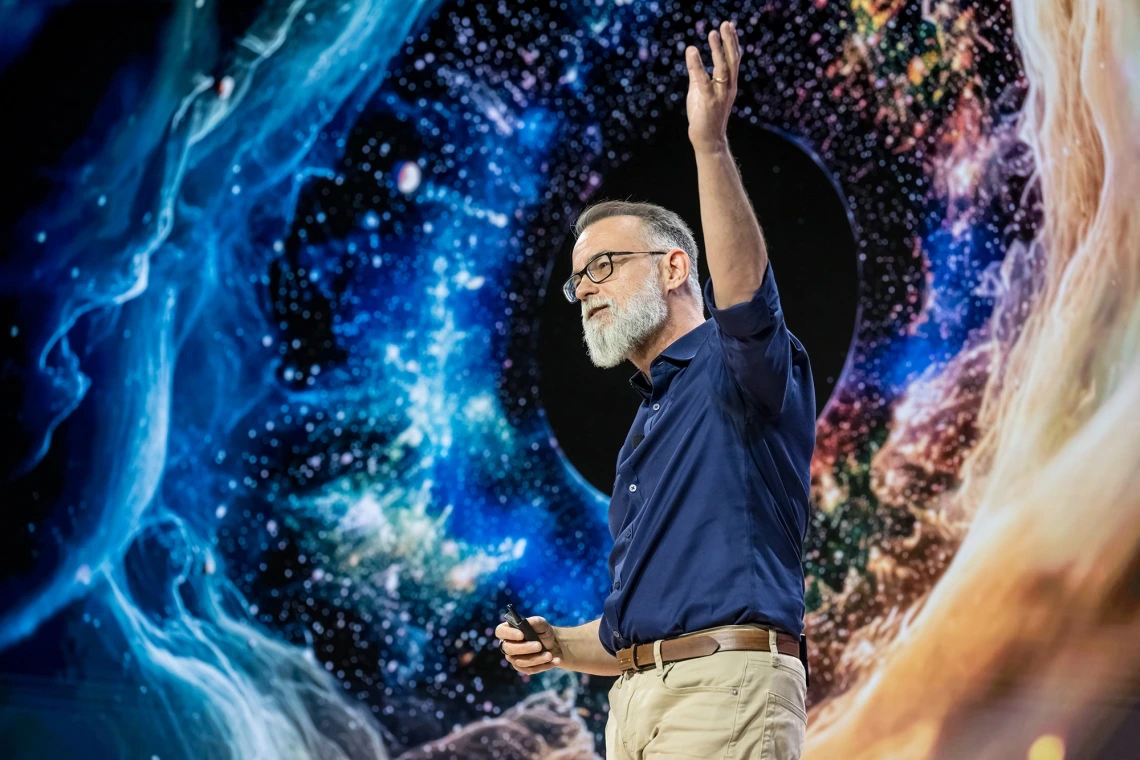$1M Gift to Advance Consciousness Research at the AABC

Dante Lauretta, Arizona Astrobiology Center director and principal investigator of NASA's OSIRIS-REx mission, presented insights into the intersection of astrobiology and consciousness at the 2024 MARS Conference in March. The MARS Conference is hosted by Amazon founder Jeff Bezos and brings together experts in machine learning, automation, robotics, and space.
Ben Rose Photography
The University of Arizona's Arizona Astrobiology Center has received a $1 million gift from Eugene Jhong, a retired Google software developer turned philanthropist, to support interdisciplinary research exploring the origins of life and consciousness.
The academic field of consciousness studies explores the mysteries of how we experience the world, focusing on how thoughts and feelings emerge from the brain. Bringing together insights from philosophy, psychology and neuroscience, scholars of consciousness explore vital questions about what it means to be conscious and how our inner experiences connect to the physical world.
Jhong's donation will support research salaries, graduate and undergraduate internships, and other needs, solidifying the center's position at the forefront of the field.
"I believe a shift is occurring in consciousness studies, embracing ideas that historically have been shortsightedly dismissed by the scientific community," Jhong said. The University of Arizona has long been home to some of the brightest minds and most innovative ideas in this field. I am proud to support the expansion of this research through the Arizona Astrobiology Center."
"Mr. Jhong's generous gift positions the Arizona Astrobiology Center to be a national leader at the intersection of consciousness and the origins of life, allowing us to conduct truly groundbreaking research," said interim Senior Vice President for Research and Innovation Elliott Cheu.
Housed in the Office of Research, Innovation and Impact and established in 2023, the Arizona Astrobiology Center brings together experts from planetary sciences to the arts and humanities to explore the potential for life on other planets, search for signs of life beyond Earth, study extreme environments, and develop new tools for detecting life in the universe. U of A Regents Professor of planetary sciences Dante Lauretta serves as the center's director.
"This generous gift from Mr. Jhong enables us to bridge two of humanity's most profound questions: How did life begin, and what does it mean to be conscious? By combining astrobiology and consciousness studies, we have the opportunity to unravel some of the deepest mysteries of our existence," Lauretta said.
The study of consciousness fell out of the mainstream during most of the 20th century, but in the late 1980s, popular books by notable scientists including Francis Crick and Roger Penrose revived interest. In 1994, the U of A hosted the first interdisciplinary conference on the topic.
Jhong's interest in consciousness was sparked after attending that conference, which was led by professor emeritus Stuart Hameroff, co-founder and director of the Center for Consciousness Studies, which is part of the College of Social and Behavioral Sciences. Jhong then went on to fund the creation of the U of A's minor in consciousness studies.
"We could have been robotlike 'zombies' with behavior but no inner life, but we aren't. There's great demand for an interdisciplinary approach to solving this problem of how and why we came to have feelings and awareness, and I look forward to working with the AABC to explore these important questions from an astrobiological angle," Hameroff said.
Lauretta is not only the center's director but also the principal investigator of NASA's OSIRIS-REx mission to collect rubble from the surface of the asteroid Bennu. With Jhong's gift, the Arizona Astrobiology Center is poised to expand the university's cutting-edge space science exploration into the realm of consciousness, linking the study of extraterrestrial materials with deep questions of the human experience.
On the one-year anniversary of the OSIRIS-REx mission returning a sample from the asteroid Bennu to Earth, Jhong's $1 million gift marks a new chapter of research led by Lauretta and Hameroff, focused on exploring how the ancient rubble from the surface of Bennu could provide insights into the origins of life and consciousness, bridging the gap between astrobiology and the mysteries of the mind.
"The ancient materials from Bennu offer a rare chance to study the origins of life, and through that lens, we hope to explore the potential connections between those origins and the emergence of consciousness. This groundbreaking research could redefine our understanding of life's complexity both on Earth and beyond," Lauretta said.
Former university President Robert C. Robbins added that "Mr. Jhong's extraordinary commitment to advancing knowledge in these crucial areas underscores the University of Arizona's leadership in both astrobiology and consciousness studies. His gift will have a lasting impact on our ability to explore fundamental questions about the very essence of the human experience, and I am grateful for his generosity."
"The University of Arizona is a special place for inquiry and making discoveries that many may think impossible. This gift to research how the inner life of humans came to be in the context of how we became human through the building blocks of life is a compelling way to expand our research enterprise," said John-Paul Roczniak, president and CEO of the University of Arizona Foundation.
This gift to the Arizona Astrobiology Center is part of Fuel Wonder, the university's $3 billion fundraising effort. Gifts already made to the campaign are giving every student access to a cohesive ecosystem of support, powering new insights into the human immunome, and transforming research in areas including cancer, engineering, space sciences and the humanities.
